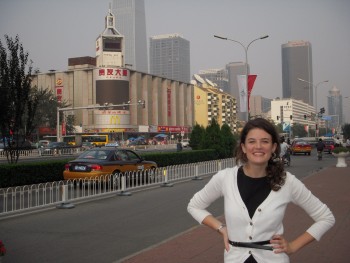Q&A: Leigh Fitzgerald '06 Clears the Air in One of the World's Most Polluted Cities

Leigh Fitzgerald on the Avenue of Eternal Peace in Beijing.
Details
Leigh Fitzgerald '06 is contributing to the purification of one of the world's most polluted cities. As a senior associate at Arreon Carbon, based in Beijing, China, Fitzgerald trades carbon credits that allow businesses to more effectively reduce their greenhouse gas emissions. She shares her thoughts on her job, the Olympics, and living abroad:
Haverford College: What are your job responsibilities?
Leigh Fitzgerald: The vast majority of the work I do is part of a Kyoto Protocol scheme called the Clean Development Mechanism. My company works with Chinese enterprises to develop projects—wind farms, for example—that reduce greenhouse gas emissions beyond what would have happened in“business as usual” circumstances. We help them develop the documentation to submit their project for United Nations approval and then invest in the carbon credits. I myself am focused on the commercial end of the business—nailing out agreements to purchase the credits.
HC: Does Beijing's problem with pollution make your job more challenging?
LF: It is polluted here. Environmental issues, therefore, are not quite as abstract to policymakers in Beijing as they would be in Washington, D.C. I suppose this may provide incentive for Chinese officials to address them—their kids and grandkids are breathing in the same dirty air as everyone else in Beijing. This could affect my job from a“big picture” perspective.
On a daily level, however, the pollution affects general quality of life much more than it does my work. The skies are often gray and the air we breathe is not clean. Long term, that gets old. I ran track competitively for about ten years. Until I arrived here, I ran outside nearly every day of my life. Now I have to run on a treadmill in a gym because it is too polluted to run outside. That has been a difficult adjustment for me.
HC: Were you involved in any efforts to prepare the city for the Olympics?
LF: Unlike many of my friends working in media, PR and advertising, who had been doing nothing but Olympics for months and months, I was not very involved in the preparation in any formal capacity. More informally, however, Olympic preparation has been an inescapable part of life for the past few years. Even as far back as 2006, when I first arrived, I could stand on pretty much any street corner and see a sign talking about the Olympics in one way or another:“Welcome the Olympics, line up to get on the bus,”“Welcome the Olympics, drive in a civilized manner.” Signs like that were everywhere. A lot of people were studying English for the Games and would often spring at the chance of having a native English speaker to practice with. I taught words to cashiers at the grocery store, made a recording of the English pronunciations of Olympic venues and starred in a video made to teach police officers English.
HC: Did you attend the Olympics? What was it like?
LF: Yes, I was lucky enough to go to the rowing and a few days of track. Having the Olympics here was a little surreal. We saw the best in the world compete, then drank a beer with them at our favorite hangout the next day. Most expats here, I think, had more exposure to the Games than your average Beijinger. China is not a Western country and the vast majority of Olympic visitors from the West had never been to China before. They tended to gravitate to the same places that Western expats do and related to a fellow foreign face. Most of my non-Chinese friends met and hung out with athletes, coaches or journalists visiting at some point during the Games.
HC: How long have you lived in Beijing and what do you like about living there?
LF: I moved here shortly after graduation in the summer of 2006—so a little more than two years now. I think that I came to China for the challenge and stayed for the food. American instincts do not necessarily help me here, which keeps things interesting. On a daily basis, I learn a lot more than I would working in an American city. After a few years here, though, I am becoming more and more Sinofied. The daily challenges are not as great as they were when I first arrived and I've found myself addicted to strange dishes like“ma la xiang guo,” a numbingly spicy stir fry that is almost certainly not available outside of China.
HC: How was your Chinese before you moved to Beijing? How has it improved?
LF: I studied Chinese at Haverford, including a semester studying abroad in Beijing, so I had a decent base before I moved here. Classroom Chinese, though, can only get you so far. When you are at a business meeting or eating dinner with friends, you don't speak like you would to a professor in class. Before I came here, my Chinese was pretty stiff. It's much more versatile now.
HC: What do you like to do outside of work?
LF: I try to travel as much as possible. I've gotten to see a lot of China, but also Japan, Thailand, Vietnam, Laos. Those places are hard to get to from the U.S.—I'd like to see as much as I can while I'm based in this part of the world.



